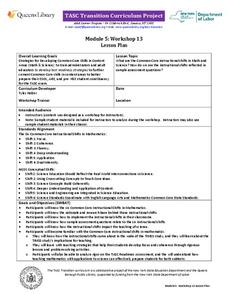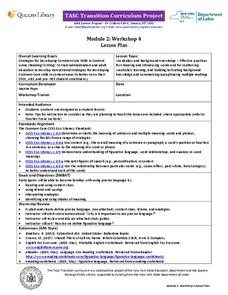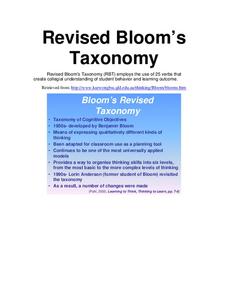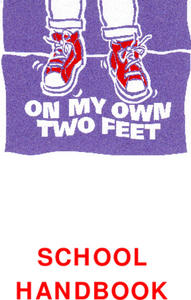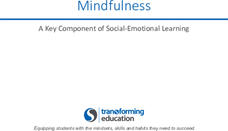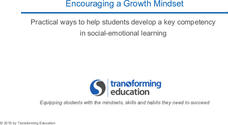Iowa Department of Education
Iowa’s Social-Emotional Learning Competencies
Whether new to social-emotion learning, or familiar with the Collaborative for Academic, Social, and Emotional Learning competencies, this packet is a must-have. The resource contains detailed information about the purpose of the...
Indiana Department of Education
Social Emotional Toolkit
Looking for some tools to help you incorporate social and emotional learning into your curriculum? Then check out this 79-page kit packed with ideas for developing social-emotional learning competencies. The first section provides...
AQA
Teaching Guide: Set Design
The task of creating a set for a theater production may leave theater arts students asking where to begin. Set their minds at ease with a packet that not only provides information about the elements of design, but also guides them...
New York State Education Department
TASC Transition Curriculum: Workshop 13
The six instructional shifts in this workshop definitely move math and science teachers' understanding of instruction. The workshop, 13th out of a series of 15, asks participants to examine sample tests and to look at how the six...
New York State Education Department
TASC Transition Curriculum: Workshop 11
You'll C-E-R a difference in classroom achievement after using a helpful lesson plan. Designed for economics, civics, government, and US history classes, participants practice using the CER model to craft arguments about primary and...
New York State Education Department
TASC Transition Curriculum: Workshop 4
Why is it important to use precise language? Participants explore this question in the fourth activity in a series of 15 on effective instruction. Perfect for all content areas, the activity promotes appropriate language choice through...
Autism Speaks
Autism Speaks School Community Toolkit
Guide members of the educational community in understanding and supporting autistic learners. A kit from Autism Speaks includes an array of tools designed for parents, teachers, and community members.
PBIS World
Problem Behavior Questionnaire
It can be frustrating for a child and teacher alike when a problem behavior arises over and over in a classroom. Analyze when, where, and why the behavior is occurring with a questionnaire, in which educators mark the percent of the time...
All Things PLC
Cultural Shifts in a Professional Learning Community
Talk about a quantum shift in educational thinking. The shift in attitudes toward the fundamental purposes, the shifts in the use of assessments, the shift in the response of educators when students don't learn, the shift in the work of...
Attentance Work
Teaching Attendance: Everyday Strategies to Help Teachers Improve Attendance and Raise Achievement
Build a culture of attendance with the help of this 7-page toolkit loaded with suggestions for specific things you and parents can do to improve attendance, and in turn, raise the achievement of learners. Included are suggestions for...
Oregon Education Professional Development Commission
The First Days
Designed for first-year teachers, this 116-page packet has it all. Questions you should ask administrators and fellow teachers, a checklist of things to do before school starts, a school-year calendar to record special school events and...
Ms. Mariely Sanchez
New Teacher’s Survival Guide
An amazing amount of information is packed into this 44-page packet. Everything from how to avoid first day jiggers to planning first day activities, from personal and classroom safety tips to how to break up fights, from classroom setup...
Universiti Tunku Abdul Rahman
Revised Bloom’s Taxonomy
For decades Bloom's Taxonomy has helped to guide educators' approach to instruction, but as times change and students change, so too must the methods for teaching evolve. Introducing teachers to the new revised Bloom's Taxonomy, this...
Curated OER
Promoting Disability Awareness and Acceptance in Childhood
Create a safe and respectful school environment with the help of this special education teaching guide. Offering dozens of instructional ideas and activities for raising awareness and acceptance of children with disabilities, this is a...
Curated OER
Using Google Docs
This is a fantastic resource for teachers to have in their tool belts upon entering into the world of using Google Docs in the classroom! It is a reference sheet with step-by-step instructions and graphics for everything from basic...
Department of Education (Ireland)
On My Own Two Feet School Handbook
The "On My Own Two Feet" School Handbook describes a carefully scaffolded, richly detailed substance abuse program designed for middle and high schools. Chapters look at approaches to prevention, suggestions for organizing and...
Transforming Education
SEL for Educators Toolkit
Four resources make up the SEL toolkit for educators. Intended for those that teach kindergarten to twelfth grade, helpful files include a companion guide, presentation, reference list, and a one-page snapshot that neatly showcases the...
Transforming Education
Trauma-Informed SEL Toolkit
The Trauma-Informed SEL Toolkit is a presentation for educators who seek to create a reliable environment where scholars who have experienced adversities and trauma feel supported, safe, and ready to learn.
Transforming Education
Mindfulness Toolkit
The Mindfulness Toolkit is designed to provide educators with the information they need to introduce the social-emotional competency of mindfulness into their school. The kit includes background information to help teachers develop their...
Transforming Education
Growth Mindset Toolkit for Parents
Designed as a workshop, the Growth Mindset Toolkit introduces parents and guardians to the growth mindset competency, one of the five social-emotional learning areas. The workshop provides caregivers with information about why lessons...
Transforming Education
Growth Mindset Toolkit
A nine-slide presentation provides educators with practical ways they can help young people develop a growth mindset, a key competency in social-emotional learning.
Transforming Education
Social Awareness Toolkit
A 32-slide professional development presentation introduces administrators, counselors, and teachers to the social awareness competency. The presentation includes specific strategies to help learners develop social awareness, identifies...
Transforming Education
Self-Management Toolkit
Designed to be used for professional development, the self-management toolkit provides teachers, counselors, and administrators with the training they need to address this key competency. The toolkit includes all the materials necessary...
Transforming Education
Self-Efficacy Toolkit
A PowerPoint presentation prepares instructors for teaching learners about self-efficacy, a key competency of social-emotional learning. The 29-page presentation is designed to give administrators and teachers a deeper understanding of...





